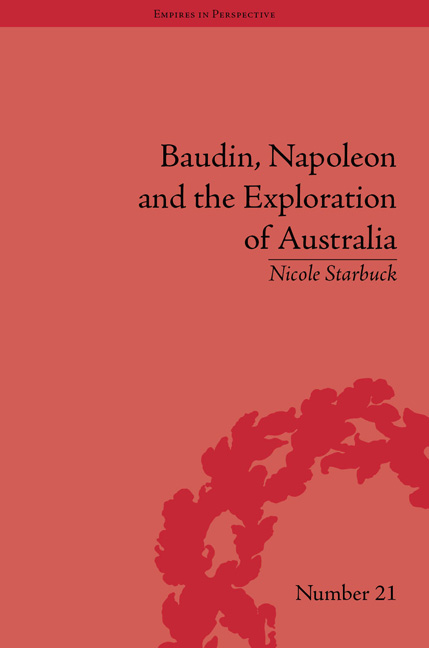Book contents
- Frontmatter
- CONTENTS
- Acknowledgements
- List of Figures
- Introduction: Voyaging out of the Enlightenment
- 1 Between Revolution and Empire: France and its Australian Voyage in 1800
- 2 ‘I Should Wish … to Establish a Few Tents on Shore’: The Port Jackson Stay
- 3 Disciplining Passions: French Naval-Voyagers at Anchor
- 4 The French and the British: A Diplomatic Relationship
- 5 Liberty, Equality and ‘Civilization’: Observations of Colonial Aborigines
- 6 Swans, Frogs and Rum: Natural History in an ‘Unnatural’ Space
- 7 Baudin's ‘New Expedition’
- 8 Epilogue: Voyaging into the Nineteenth Century
- Notes
- Works Cited
- Index
8 - Epilogue: Voyaging into the Nineteenth Century
- Frontmatter
- CONTENTS
- Acknowledgements
- List of Figures
- Introduction: Voyaging out of the Enlightenment
- 1 Between Revolution and Empire: France and its Australian Voyage in 1800
- 2 ‘I Should Wish … to Establish a Few Tents on Shore’: The Port Jackson Stay
- 3 Disciplining Passions: French Naval-Voyagers at Anchor
- 4 The French and the British: A Diplomatic Relationship
- 5 Liberty, Equality and ‘Civilization’: Observations of Colonial Aborigines
- 6 Swans, Frogs and Rum: Natural History in an ‘Unnatural’ Space
- 7 Baudin's ‘New Expedition’
- 8 Epilogue: Voyaging into the Nineteenth Century
- Notes
- Works Cited
- Index
Summary
Baudin composed his last letters at Mauritius, just shortly before he finally succumbed to tuberculosis. ‘I have enough strength left at the moment’, he wrote to the Minister of Marine, ‘to assure you that the intentions of the Government have been fulfilled and that this voyage will be honourable for the French’. The Géographe drew into the port at Lorient six months later and, while the naturalists of the Institut were delighted with the collections it brought them, the government paid little attention to its arrival and to the accomplishments of the expedition in general. Moreover, in the long term, despite the vast size of the collection and the meticulous detail and copious extent of the records, Baudin's accumulation of knowledge did not stick in French history, as certain voyages of the eighteenth century had done. Certainly, the expedition's legacy would have been strengthened had the commander, who had planned and conceptualized that second and most successful campaign himself, been able to present the results in person. Yet Baudin's expedition was not unique in returning without its captain, and, in any case, the Consuls and ministers had little time for appreciating distant achievements of any sort on what was the eve of the First Empire. In fact, just as the nation advanced into a new era, so too did scientific voyaging – and maritime expeditions lost their prominence in the history of France.
Over the course of the nineteenth century, scientific ships functioned with increasing pragmatism and efficiency as tools of science and the state. No further maritime expeditions were sent out by Napoleon, whose attention for the remainder of his reign was fixed on reforming France and building it into a continental empire; and while the more peaceful if politically unstable eras of the restored Bourbons and the Orleanists, which followed, were eras of unprecedentedly frequent voyaging to Oceania, it was voyaging that was also more politically and commercially motivated than previously – voyaging still driven at times by questions of science but at other times, first and foremost, by interests in trade and territory.
- Type
- Chapter
- Information
- Baudin, Napoleon and the Exploration of Australia , pp. 137 - 142Publisher: Pickering & ChattoFirst published in: 2014

